IBPS RRB Clerk Mains Quantitative Quiz
Quantitative Aptitude can enhance your performance as a whole. All you need to do is clear your basics first and practice more and more. Quantitative Aptitude is a subject that helps you to boost your score and confidence. Every year IBPS comes with changes in the pattern of questions on Quantitative Aptitude which makes it difficult for students to decode in the examination hall. Giving mocks and Quizzes on a regular basis will help you to crack every change in the pattern. Adda 247 gives daily quizzes for practice as the IBPS RRB Clerk Mains is scheduled for 20 October. This is a quiz based according to the same pattern that was asked on IBPS RRB PO Mains. Here is the IBPS mains Quantitative Aptitude Quiz of 17th October 2019.
Directions (1-5): Study the given graph carefully to answer the questions that follow:
The bar graph given below shows the number of people (in thousands) using different mobile services in given years.
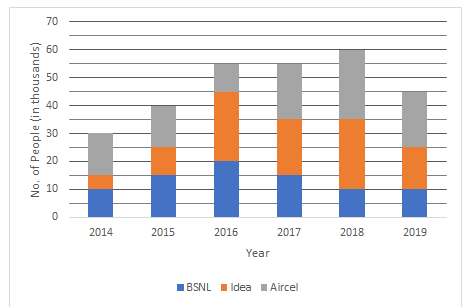
Q1. What is the sum of average number of people using mobile service of Idea for all the years together and average number of people using mobile service of BSNL for all the years together?
(a) 22000
(b) 16000
(c) 30000
(d) 35000
(e) 28000

Q2. The total number of people using all the three mobile services in the year 2017 is what per cent of the total number of people using all the three mobile services in the year 2018?
(a) 89.75%
(b) 93.33%
(c) 88.15%
(d) 91.67
(e) 90.33%

Q3. The number of people using mobile service of Aircel in the year 2016 and 2019 forms what per cent of the total number of people using mobile services of Idea in year 2018 and 2019 together?
(a) 60%
(b) 90%
(c) 50%
(d) 75%
(e) 100%

Q4. What is the ratio of the number of people using mobile service of BSNL in the year 2015 to that of those using the same service in the year 2014?
(a) 8 : 7
(b) 3 : 2
(c) 19 : 13
(d) 15 : 11
(e) 5∶3
![]()
Q5. What is the difference between total number of people using mobile service of Idea in the years 2018 and 2019 together and number of people using mobile services of Aircel in the year 2015 and 2017 together?
(a) 5,000
(b) 10,000
(c) 15,000
(d) 20,000
(e) 0

Directions (6-10): Each of the question below consists of a question and two statements numbered (i) and (ii) given below it. You have to decide whether the data provided in the statements is sufficient to answer the question. Read both the statements and give the answer.
(a) If the data in statement (I) alone is sufficient to answer the question, while the data in statement (II) alone is not sufficient to answer the question.
(b) If the data in statement (II) alone is sufficient to answer the question, while the data in statement (I) alone is not sufficient to answer the question.
(c) If the data either in statement (I) alone or in statement (II) alone is sufficient to answer the question.
(d) If the data both statements (I) and (II) together are not sufficient to answer the question.
(e) If the data in both statements (I) and (II) together are necessary to answer the question.
Q6. 6 men and 10 women are working together in a field. After working for 2 days, 3 men and 6 women leave the work. How many more days will be required to complete the work?
I. 12 men can complete three-fourth of the same work in 12 days
II. In 1 day, the work done by 2 men is equal to the work done by 3 women.
(a) If the data in statement (I) alone is sufficient to answer the question, while the data in statement (II) alone is not sufficient to answer the question.
(b) If the data in statement (II) alone is sufficient to answer the question, while the data in statement (I) alone is not sufficient to answer the question.
(c) If the data either in statement (I) alone or in statement (II) alone is sufficient to answer the question.
(d) If the data both statements (I) and (II) together are not sufficient to answer the question.
(e) If the data in both statements (I) and (II) together are necessary to answer the question.

Q7. What percentage of simple interest per annum did Anuj pay to Aman?
I. Anuj borrowed Rs 5000 from Aman for 2 years
II. Anuj returned Rs 5500 to Aman at the end of 1st year and settled the loan.
(a) If the data in statement (I) alone is sufficient to answer the question, while the data in statement (II) alone is not sufficient to answer the question.
(b) If the data in statement (II) alone is sufficient to answer the question, while the data in statement (I) alone is not sufficient to answer the question.
(c) If the data either in statement (I) alone or in statement (II) alone is sufficient to answer the question.
(d) If the data both statements (I) and (II) together are not sufficient to answer the question.
(e) If the data in both statements (I) and (II) together are necessary to answer the question.

Q8. What is the length of a running train crossing another 190 metre long train running in the opposite direction?
I. The trains took 12 seconds to cross each other.
II. The relative speed of the two trains was 120 km/h
(a) If the data in statement (I) alone is sufficient to answer the question, while the data in statement (II) alone is not sufficient to answer the question.
(b) If the data in statement (II) alone is sufficient to answer the question, while the data in statement (I) alone is not sufficient to answer the question.
(c) If the data either in statement (I) alone or in statement (II) alone is sufficient to answer the question.
(d) If the data both statements (I) and (II) together are not sufficient to answer the question.
(e) If the data in both statements (I) and (II) together are necessary to answer the question.

Q9. What is the profit percent gained by selling an almirah?
I. 4% discount is given on list price and if discount is not given, 25% profit is gained.
II. The cost price of the almirah is Rs 18,000.
(a) If the data in statement (I) alone is sufficient to answer the question, while the data in statement (II) alone is not sufficient to answer the question.
(b) If the data in statement (II) alone is sufficient to answer the question, while the data in statement (I) alone is not sufficient to answer the question.
(c) If the data either in statement (I) alone or in statement (II) alone is sufficient to answer the question.
(d) If the data both statements (I) and (II) together are not sufficient to answer the question.
(e) If the data in both statements (I) and (II) together are necessary to answer the question.

Q10. Find the length of rectangle whose area is equal to the area of the right-angled triangle.
I. The base of the triangle is 30 cm
II. The height of the triangle is 60 cm.
(a) If the data in statement (I) alone is sufficient to answer the question, while the data in statement (II) alone is not sufficient to answer the question.
(b) If the data in statement (II) alone is sufficient to answer the question, while the data in statement (I) alone is not sufficient to answer the question.
(c) If the data either in statement (I) alone or in statement (II) alone is sufficient to answer the question.
(d) If the data both statements (I) and (II) together are not sufficient to answer the question.
(e) If the data in both statements (I) and (II) together are necessary to answer the question.

Directions (11-15) : What approximate value should come in the place of the question mark ‘?’ in the following questions ? (You are not expected to calculate the exact value.)
Q11. 27.96% of 75.12 + 17.91 + 20.08% of 49.96 =?
(a) 39
(b) 31
(c) 29
(d) 49
(e) 45
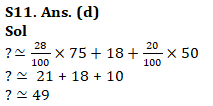
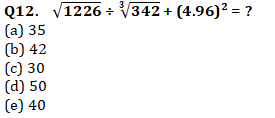
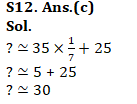
Q13. 249.997 × 20.17 ÷ 5.09 – (8.97)³ = ?
(a) 271
(b) 281
(c) 239
(d) 254
(e) 284
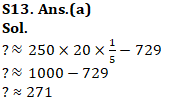
Q14. 161 ÷ 39 + 111.95 × 15 = ?
(a) 1720
(b) 1665
(c) 1735
(d) 1685
(e) 1695
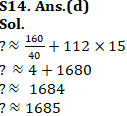
Q15. 149.998 × 9.87 – 30.13 % of 7496 + ? = (28.01)²
(a) 1168
(b) 1354
(c) 1454
(d) 1334
(e) 1534

For 200+ most important arithmetic questions
- Quantitative Aptitude Study Notes for Bank Exams
- 100 MCQs Data Interpretation | Download Free PDF’s of DI
- Quantitative Aptitude Questions for all Competitive Exams
- LIC ADO Mains Result 2019
All the Best BA’ians for IBPS RRB Clerk Mains

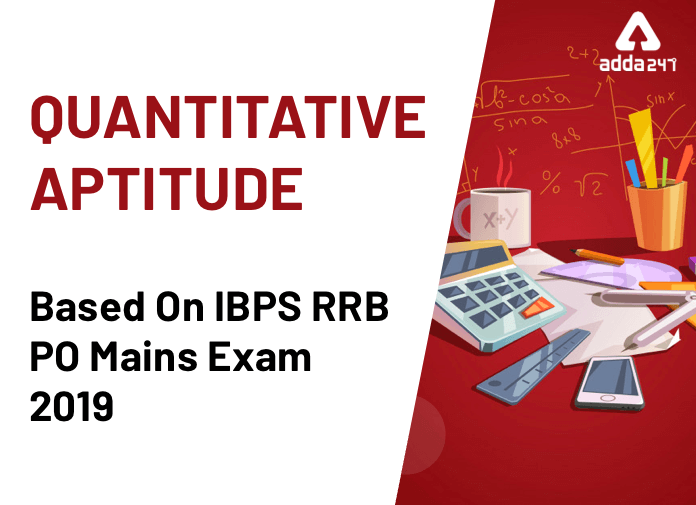
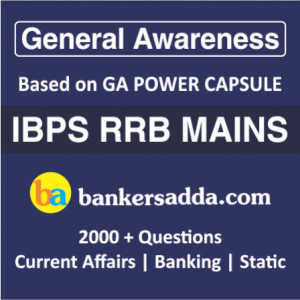
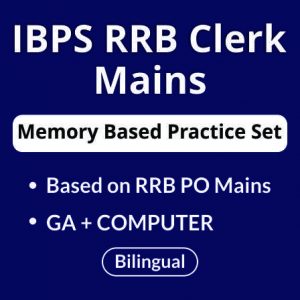

 GA Capsule for SBI Clerk Mains 2025, Dow...
GA Capsule for SBI Clerk Mains 2025, Dow...
 The Hindu Review October 2022: Download ...
The Hindu Review October 2022: Download ...
 The Toughest Quant Section Ever in SBI P...
The Toughest Quant Section Ever in SBI P...




